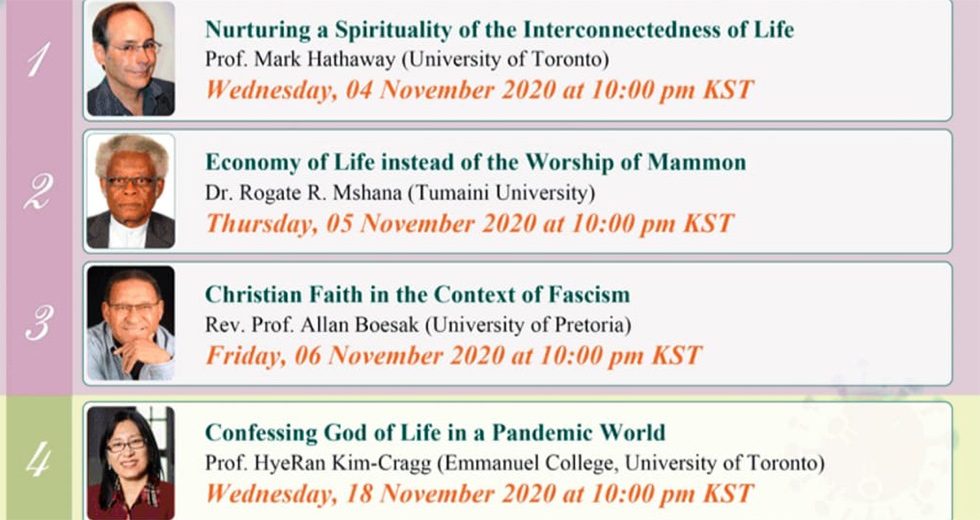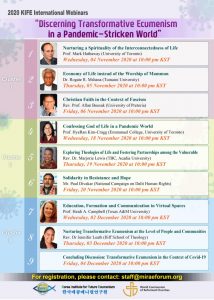WCRC co-sponsors series on ecumenism in a pandemic-stricken world
Posted on October 27, 2020 by Phil Tanis

The World Communion of Reformed Churches (WCRC), Korean Institute for Future Ecumenism (KIFE), and the Transformative Ecumenism Collective (TEC) are co-sponsoring a series of webinars on “Discerning Transformative Ecumenism in a Pandemic-Stricken World.”
The series of nine webinars, which require registration, begin on Wednesday, 4 November, continue through 4 December, and feature a variety of leading ecumenists discussing critical issues.
COVID-19, while turning the world upside down, continues to expose some of its harsh realities. Systemic greed, sharp economic disparities, environmental destruction, war economies, supremacist ideologies, and exploitation of vulnerable people are some of many that stand out to mirror the extent of its moral decadence. Alongside these, a new awareness that the current trends will only be more detrimental for the future of life and the earth, and a new resolve to search for alternatives, also seem increasingly prominent.
Where do churches and Christian organizations find themselves amidst these changes and trends? How does the pandemic challenge their cherished understandings of church, mission, discipleship, and worship? What alternative visions and signposts do they have to offer to a world that finds itself at crossroads?
Such an exploration seems urgent and necessary for the churches’ own credibility and relevance. Most of these, in the past as well as the present, have been either complicit with or indifferent towards these realities, in their preoccupation with survival interests and priorities of power and privilege. 
The pandemic-induced fears and anxieties seem to have already made many Christian communities to be on a pause mode, waiting for the calamity to pass. However, this also seems to be the opportune moment—the kairos—for them to play a creative part in shaping the emerging world and to reclaim their vocation of God’s mission of justice and life for all.
Perhaps a re-imagination of ecumenism could help. Oikoumene, a Greek word, indicates the whole inhabited world as one household, implying that we live and relate with one another as interdependent beings within the earthly home given to us by God. It is anchored both in the consciousness of our common life as well as the inherent value of every human being and the earth. As such, it indicates an alternative vision of the world and avocation of nurturing a culture of life that upholds the sanctity and interconnectedness of life at all levels.
Unfortunately, “ecumenism” is used mostly in reference to church or Christian unity. Some also erroneously use this term to mark a distinction between “ecumenical” and “evangelical,” implying that the former is an approach to respond to the call of the gospel in social spheres, whereas being “evangelical” is a response to the command: “Go and make disciples of all nations” (Matthew 28:19).
Furthermore, both ecumenism and the ecumenical movement are often associated with their organizational expressions, which while being constrained by institutional issues, are also overwhelmed with increased clerical participation and perspectives, leadership crisis, ecclesiastical matters, and theological controversies. These also continue to depend on classical/traditional western theologies as resources for their engagement in a much changed and rapidly changing world today. As such, these are also steadily losing their purpose and relevance. The current accent on ecumenism is motivated by a deeper awareness of the manifold struggles for life in many parts of the world, and the role that certain expressions of Christian faith can play together in accompanying these processes towards a future that grants life with dignity for all.
This series of webinars are being offered as spaces and possibilities for exploration of new meanings of ecumenism with the hope that it could be the guiding vision for Christian engagement in the world today.
To register, please contact staff@miraeforum.org.
The Transformative Ecumenism Collective (TEC) is an informal network of theologians and ecumenists from different parts of the world who have been in conversation since 2012 to re-imagine ecumenism for the 21st Century beyond the contours of institutional/organizational expressions.
The Korean Institute for the Future of Ecumenism (KIFE) is an initiative of some concerned Christian leaders deeply committed to the cause of promoting ecumenism as an instrument of ecclesial renewal and social transformation in Korea and beyond.
 World Communion of Reformed Churches
World Communion of Reformed Churches